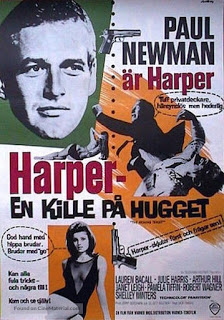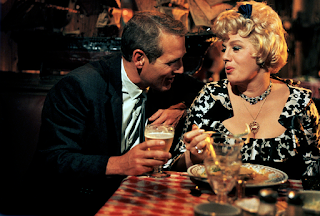Harper
Director: Jack Smight
Year: 1966
Rating: 7.5
Based on the 1949 crime novel The Moving Target
from Ross MacDonald, the film writers follow the book extremely faithfully
other than throwing in a pointless subplot about Harper and his separated
wife. In the book the couple are already divorced and she never makes an
appearance other than in his thoughts but maybe they needed a part for Janet
Leigh. The Moving Target was MacDonald's first of eighteen novels about his
private detective along with a number of short stories. In the books the
detective's name is Lew Archer. For reasons unknown, the filmmakers keep
everyone else's name as it appears in the book except for Archer or Harper.

MacDonald is considered the heir apparent to Hammett and Chandler in the
hard-boiled genre and in fact the name Archer is a polite nod to Sam Spade's
partner who dies early on in The Maltese Falcon. Like Chandler, Archer trolls
the urban sprawl of Los Angeles usually digging into the dirty underbelly
of hidden secrets in dysfunctional families where the emotions of hate and
greed have been percolating for years. Archer solves his cases by bringing
the skeletons to the surface. MacDonald had his own family issues which likely
contributed to this focus - a father who left him as a child, a daughter
who became drug addicted and ended up committing suicide and an author wife
(Margaret Millar) who he often didn't get along with. MacDonald saw the dirty
laundry but he also saw the pain; saw the innate tragedy when the place called
home that is expected to be our sanctuary is like barbed wire constantly
cutting little bits out of you. I read a lot of the Archer books decades
ago but have begun them again - it is great writing with beautiful descriptive
imagery, well-drawn out characters, tough cynical dialogue as one expects
in this genre but also strewn with mercy and justice. No matter how jaundiced
Archer's view of humanity is, he sees himself as battling the wrongs of life
with little reward other than bruises and an empty bed to come home to.
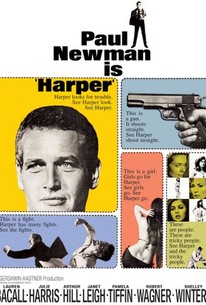
This movie is given the Paul Newman treatment to some degree which I can't
decide whether it is a good or a bad thing. That trademark wide grin of his,
the startling blue eyes, the smart-alecky remarks, the put on accents - none
of it particularly Lew Archer like of the books but cinematically it makes
sense. Newman was a huge star - let him be Newman. The film has an excellent
cast beyond Newman - Janet Leigh, Lauren Bacall, Julie Harris, Robert Wagner,
Shelly Winters, Robert Webber, Strother Martin, Arthur Hiller, Harold Gould
and Pamela Tiffin as the baby sex bomb. As soon as I saw the cast I knew
exactly what characters they would play in the film.
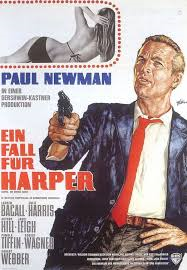
Harper is hired by a bitter sharp tongued wife to look for her missing millionaire
presumably kidnapped husband - though in truth she doesn't really want him
back. Neither does the pouty mouthed bikini clad daughter. No one really.
He is by all accounts a bastard. But that isn't Harper's concern - he goes
where the leads take him through a world of lushes, druggies, brutes, illegal
immigrants and a phony church high on a mountain. It isn't the fine side
of society that Harper trawls in. Much of the film unwinds slowly - almost
casually - until it all blows open at the end.
Nine years later Newman was to reprise Harper in The Drowning Pool which
was Archer's second book.
The Drowning Pool
Director: Stuart Rosenberg
Year: 1975
Rating: 6.5
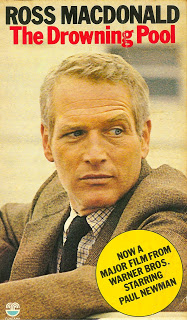
Nine years after Harper, Paul Newman returns as private eye Lew Harper in
The Drowning Pool. It is based on Ross MacDonald's second novel in his Lew
Archer series of books. Like many of MacDonald's books, Archer gets entangled
in a dysfunctional family on the verge of a breakdown. This was a theme that
flowed through many of his books and to some degree reflected his own life.
Lew Archer is considered by many critics to be the inheritor to Sam Spade
and Philip Marlowe - but over the years his character never became as iconic
as those and the two films based on him never captured the imagination as
did The Maltese Falcon or The Big Sleep. Those two films are classic noir
and are constantly shown on TV or discussed - but by Harper in 1966 the age
of noir was over and so these two films never made it into the noir canon.
But the books did. It just never translates into the films.
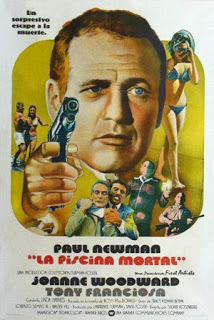
Harper was a stronger film than this sequel - perhaps because the filmmakers
decided here to take Harper (Archer) out of his natural milieu, Southern
California and set it in New Orleans. It never feels right and I can't imagine
why this decision was reached - maybe just to soak in the New Orleans slow
as molasses sleepy mood and forcing all the actors to do their best O-leans
accent. It gets tiresome. Still for the most part with a number of exceptions
the film does follow the skeletal plot of the book (1950).
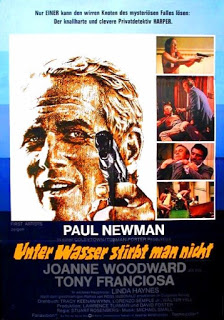
Harper is called down to New Orleans by an old fling with a problem. She
(Joanne Woodward) has received an anonymous letter accusing her of infidelity
and she wants Harper to have it stopped before her husband gets the next
one. Not that there is any love in this family - they are ruled by the iron
hand of the very wealthy matriarch, the husband is likely gay, the wife hates
him and is in fact fooling around and the daughter (Melanie Griffith) who
hates her mom and has Daddy Love issues is a jail bait Lolita who tries to
seduce Harper as soon as he hits town. Before he can get very far with his
investigation Dear Mom is found face down in the pool. Very dead. Very murdered.
This brings in a sleazy oil tycoon and his desperate frightened wife (Gail
Strickland) which leads to perhaps the best scene in the film/book when Harper
is held prisoner in a sanatorium getting tortured by a pressurized water
hose.
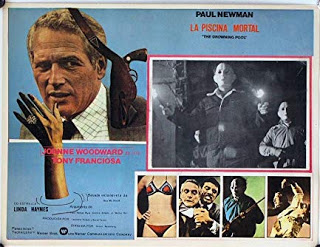
The film moves along a bit slowly with Harper doggedly refusing to quit though
everyone wants him too. As he says early on, sometimes you find out things
that should remain buried. Here secrets reach out of their graves and hurt
you. Perhaps the main weakness of the film is the cast - sure it has Newman
and Woodward (on the downward slope of her career) but otherwise it feels
very TV Movie of the Week. It has Melanie Griffith but this was way before
she became a star and her acting is a bit wobbly. This turned out to the
last film based on Lew Archer though a TV series which starred Brian Keith
lasted for six episodes 1975. With every film practically, people will say
the book was better, but the book was really much better - MacDonald's descriptive
passages are immaculate and clean and the ugly box that this family has put
itself into is much more raw and complicated.
